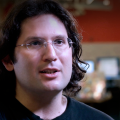The battle over privacy is starting to mature, and the public debate is moving from whether we value our privacy (we do) and whether privacy will survive (it will) to now address who controls the data that’s out there.
Every action we take in the digital domain creates a shadow that reflects our behaviour, logs our activity, and provides a privileged view into our lives. On the one hand we want to protect who can see that shadow, and who can analyze it. However on the other hand, we ourselves do not have full access to our own shadows, let alone the ability to verify its accuracy and context.
Part of the problem with properly debating privacy is that we’re not fully aware of the lengths to which we are presently under surveillance. We don’t really know when our actions are being scrutinized and when they’re not. We hold our breath and increase our general anxiety when we falsely assume that we’re constantly being watched. After all we do deserve private moments where we can exhale and cease performing for an invisible audience. Yet how are we to know when those moments are or where they might be possible?
Michael Fertik, CEO of Reputation.com and author of “The Reputation Economy” describes privacy as “an essential component of diginty, and without it we suffer”.
Dr. Sue Johnson, the best selling author and clinical psychologist similarly describes an “enormous epidemic of anxiety and depression in western society, which when you really think about it should be the opposite, we are healthier, safer, we have more toys, we have more reasons to be happy with our lives than ever.”
This is of course the great paradox of our era. We do have so many empowering opportunities afforded by technology, at the cost of a significant amount of our personal information, and yet we do not seem to be making the most of them. The issue may in fact lie in our inability to see our own digital shadows and use that “social graph” to our own benefit, rather than allow that data to be the exclusive use of advertisers and marketers.
In Avatar Secrets I described “a great contrast between the narcissism of social media and the community potential of social media. On one hand were given these very powerful publishing tools that can allow us to collaborate, that can allow us to share very intimate and important parts of our lives, but instead we’re almost taught to be narcissistic, we’re almost taught to focus on things that matter only to us.”
Thus the opportunity in the current privacy debate is not to lament what we’ve lost, but rather inspire others to rethink what we’ve got, and find ways to use our new tools and platforms to both reclaim privacy, and the control over our personal information. It’s not just about protecting our digital shadow, but also having the power to control how others can use it. This begins with our own ability to see our shadow, and with it the awareness of own personal privacy, or lack thereof.









